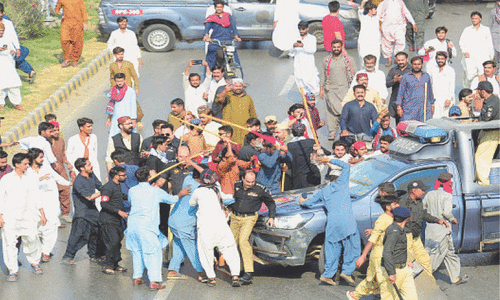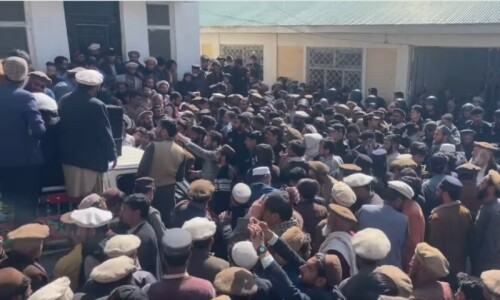KARACHI: Music and literature lovers were treated to an absorbing conversation on the salient features of ghazal gaiki (ghazal singing) between eminent music composer Arshad Mahmud and distinguished sitar player Ustad Nafees Ahmed at the Mohatta Palace Museum on Friday evening.
Mahmud set the tone for the evening by giving fundamental information about ghazal. He said it’s a unique genre of Urdu poetry which is extremely popular among poets. According to a rough estimation, 70 to 80 per cent poems in Urdu are penned in the form of a ghazal. “I’ve heard noted poets saying that a verse-wielder who can’t write a ghazal cannot be called a poet.”
Briefly touching upon its historical context, he said Hazrat Amir Khusrau (1253-1325) helped the genre grow as musicians began to use words in khayal gaiki. That’s how a connection between poets and music was created.
After explaining the technical aspect of the form (it’s rhyme and refrain patterns), Mahmud said ghazal belonged to the aristocratic culture of the region but after the advent of the radio, it gained popularity among the masses, too.
After Pakistan’s independence, and Urdu becoming the national language of the country, all renowned singers opted for ghazal singing. “The popularity of ghazal also weakened the tradition of mushaira. Before 1947, ghazal was mostly sung by women in the mujra ang or mujra style because it had elements of kathak dance. In the old compositions, listeners will find that ang. After partition, men started to sing it, and the genre changed shape.”
Nafees Ahmed, who played the harmonium and sang to demonstrate the finer points of the art form during the discussion, then played the recording of the ghazal Donon jahaan teri muhabbat mein haar ke (Faiz) sung by Ustad Barkat Ali Khan followed by Aah ko chahyey ik umr asar honay tak (Ghalib).
He said with the passage of time, it was performed in the thumri ang in which words and phrases were presented in such a way that the multiplicity of their meaning came to the fore and the feeling that they evoked was properly expressed. To illustrate the point, he played Muhabbat karney waley kam na hongay (Hafeez Hoshyarpuri) sung by Mehdi Hasan and Muddat hui hai yaar ko mehmaan kiyey huay (Ghalib) by Iqbal Bano.
Mahmud lauded composers associated with Radio Pakistan and its ‘strong editorial side’. The attention with which they treated the genre was exemplary.
Ahmed said afterwards ghazal was composed using pure ragas. He gave the examples of Gulon mein rang bharey baad-i-nau bahaar chaley (Faiz) in raga jhanjhoti and Dil-i-nadaan tujhey hua kiya hai (Ghalib) in raga shudh sarang. Then there were those composed in the khayal gaiki style such as the ones sung by Farida Khanum, he said.
At that juncture Hameed Haroon, who was moderating the programme, said to Mahmud that the audience wanted him to sing. After a bit of reluctance, Mahmud sang To kiya yeh tay hai ke ab umr bhi nahin milna by Surur Barabankvi. He did a nice job.
Since the discussion was extremely interesting, more than an hour passed in the blink of an eye, realising which Ahmed quickly mentioned the names of Ustad Amanat Ali Khan and Noor Jehan. The last type of ghazal singing that he pointed out was the qawwali ang.
The highlight of the session, arguably, came when Ahmed sang Shola tha jal bujha hun (Faraz) originally sung by Mehdi Hasan. He did justice to the difficult composition.
The event was part of the distinguished lecture series commemorating 25 years of the museum.
Published in Dawn, November 25th, 2023














































